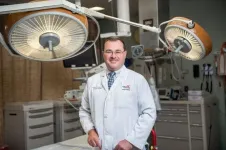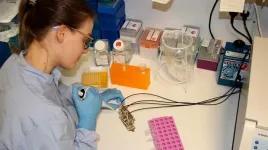Antibiotic-resistant bacteria found in cattle
Harmful bacteria are hiding in livestock; traditional methods aren't finding them
2021-06-30
(Press-News.org) Growing resistance to our go-to antibiotics is one of the biggest threats the world faces. As common bacteria like strep and salmonella become resistant to medications, what used to be easily treatable infections can now pose difficult medical challenges.
New research from the University of Georgia shows that there may be more antimicrobial-resistant salmonella in our food animals than scientists previously thought.
Using technology she developed, UGA researcher Nikki Shariat and Amy Siceloff, a first-year doctoral student in UGA's Department of Microbiology, found that traditional culturing methods used to test livestock for problematic bacteria often miss drug-resistant strains of salmonella. This finding has implications for treating sick food animals and the people who get infected by eating contaminated meat.
The study, published in Antimicrobial Agents and Chemotherapy, showed that 60% of cattle fecal samples contained multiple strains of salmonella that traditional testing methods missed. More alarmingly, Shariat found that about one out of every 10 samples tested positive for a drug-resistant strain of salmonella called Salmonella Reading. In addition to being antibiotic resistant, Salmonella Reading can cause severe illness in people.
A new technology emerges
Developed by Shariat in 2015, CRISPR-SeroSeq enables researchers to analyze all the types of salmonella present in a given sample. Traditional methods only examine one or two colonies of bacteria, potentially missing some strains of salmonella altogether. Shariat's technology identifies molecular signatures in salmonella's CRISPR regions, a specialized part of the bacteria's DNA. It also helps researchers identify which strains of the bacteria are most abundant.
In the current study, Shariat and colleagues found multiple salmonella strains in cattle feces before the animals were treated with the antibiotic tetracycline. After treatment, several of the dominant salmonella strains in the sample were wiped out, allowing Salmonella Reading to flourish.
Traditional culturing methods missed the antibiotic-resistant strain in the original samples. It was only once the antibiotic eliminated the more abundant strains that conventional methods were able to detect Salmonella Reading in the samples.
"This suggests that traditional tests have underestimated the amount of antibiotic-resistant bacteria in the past," said Shariat, an assistant professor of population health in the College of Veterinary Medicine.
But CRISPR-SeroSeq is a much more sensitive tool. It flagged the Salmonella Reading before antibiotic treatment.
"We need to know the antimicrobial resistance profiles of the bacteria that are present in animals," Shariat said. "That knowledge could make us change our choice of the type of antibiotic we use to treat ill animals. It can also help us select the best antibiotic for people who get sick from eating contaminated meat."
Missing the mark
Shariat's research shows that current surveillance efforts are likely underestimating the amount of antimicrobial resistance that exists.
Agencies that track antimicrobial resistance, like the FDA, USDA and CDC, among others, still rely on traditional sampling methods, which means they may be missing reservoirs of drug-resistant bacteria.
"The problem is you have hundreds of salmonella colonies in a given sample, but you only pick one or two of them to test," Shariat said. "It becomes a numbers game where researchers only pick the most abundant ones, and this means that they underestimate the different types of salmonella that are present."
Using CRISPR-SeroSeq can help fill that knowledge gap, giving researchers a better idea of how much antibiotic resistant bacteria exists. This information can help livestock farmers reduce and control outbreaks and guide policy on how to fight back against a growing public health threat.
INFORMATION:
Co-authors of the paper include Amy Siceloff; Naomi Ohta, Keri Norman and Morgan Scott of Texas A&M University; Guy Loneragan of Texas Tech University; and Bo Norby of Michigan State University. This study was funded by the USDA National Institute of Food and Agriculture.
[Attachments] See images for this press release:

ELSE PRESS RELEASES FROM THIS DATE:
2021-06-30
Since the onset of the COVID-19 pandemic last year, medical experts have stressed the importance of having a plan in the event of a positive test result. Where should you self-isolate? Do you have personal protective equipment for family members? Who should you notify about your diagnosis? An overwhelming 96% of healthy, educated adults surveyed by University of Houston researchers in the early stages of the pandemic did not have a comprehensive plan in mind, while 62% didn't have a plan at all.
"What that suggests is that it was difficult even for very high functioning people to digest and use all the complex information that was quickly emerging about ...
2021-06-30
Following the first wave of SARS-CoV-2 infections in spring 2020, Europe experienced a resurgence of the virus starting late summer. Although it appears clear that travel had a significant impact on the circulation of the virus, it remains challenging to assess how it may have restructured and reignited the epidemic in the different European countries.
In a new study published in the journal Nature this June 30th, 2021, Philippe Lemey - Rega Institute, KU Leuven, Simon Dellicour - SpELL, Spatial Epidemiology Lab, Université Libre de Bruxelles, and their collaborators, built a phylogeographic model to assess how newly introduced viral lineages, as opposed to ...
2021-06-30
Levelling up access to finance so that poorer countries can afford the funds needed to switch to renewable energy could see regions like Africa reaching net zero emissions a decade earlier, according to a study led by UCL researchers.
Access to finance (credit) is vital for the green energy transition needed to reduce global greenhouse gas emissions, as laid out in the Paris Agreement. But access to low-cost finance is uneven, with the cost of securing capital to help reach net zero differing substantially between regions.
Modelling created for the study, Higher cost of finance exacerbates a climate investment trap in developing economies, published in Nature Communications, ...
2021-06-30
HOUSTON - The University of Texas MD Anderson Cancer Center's Research Highlights provides a glimpse into recently published studies in basic, translational and clinical cancer research from MD Anderson experts. Current advances include expanded use of a targeted therapy for a new group of patients with leukemia, molecular studies yielding novel cancer therapeutic targets, insights into radiation therapy resistance and a community intervention to reduce cervical cancer rates.
Using acalabrutinib as initial treatment for chronic lymphocytic leukemia
Chronic lymphocytic leukemia (CLL) is a cancer that occurs in the blood, bone marrow, lymph nodes, liver and spleen. It is the most common leukemia in adults, and while there are treatments ...
2021-06-30
Heart attack, medically known as myocardial infarction (MI), is a common heart condition. MI is caused by problems in blood supply to parts of the heart. In severe cases, MI could be accompanied by ruptures in the wall separating different parts of the heart, such as in the ventricular septum (a wall that separates the right ventricle that pumps deoxygenated blood to the lungs for oxygenation, from the left ventricle that pumps oxygenated blood to rest of the body). Not surprisingly, without appropriate surgical intervention, a VSR due to MI increases the chances of death.
Current surgical techniques ...
2021-06-30
Bioplastics -- biodegradable plastics made from biological substances rather than petroleum -- can be created in a more economical and environmentally friendly way from the byproducts of corn stubble, grasses and mesquite agricultural production, according to a new study by a Texas A&M AgriLife Research scientist.
green tractor pulling a red cart through a field of bioenergy sorghum that is taller than the tractor
A bioenergy sorghum crop is harvested near College Station. (Texas A&M AgriLife photo)
This new approach involves a "plug-in" preconditioning process, a simple adjustment for biofuel refineries, said Joshua Yuan, Ph.D., AgriLife Research scientist, ...
2021-06-30
Dinosaurs roamed the Earth more than 65 million years ago, and paleontologists and amateur fossil hunters are still unearthing traces of them today. The minerals in fossilized eggs and shell fragments provide snapshots into these creatures' early lives, as well as their fossilization processes. Now, researchers reporting in ACS Earth and Space Chemistry have analyzed the molecular makeup of fossilized dinosaur eggshells from Mexico, finding nine amino acids and evidence of ancient protein structures.
Current research indicates that all dinosaurs laid eggs, though most haven't survived the test of time. And because whole eggs and shell fragments are very rare fossils, their mineral composition ...
2021-06-30
Newly published research shows that a screening program in the University of Cincinnati Medical Center Emergency Department helped detect an outbreak of HIV among persons who inject drugs in Hamilton County, Ohio, from 2014-18.
The study was published in PLOS ONE.
The results of the study highlight UC contributions to public health surveillance as yet another reason why emergency departments should be screening for undiagnosed HIV infections, according to Michael Lyons, MD, associate professor in the Department of Emergency Medicine at the UC College of ...
2021-06-30
Some people casually smoke cigarettes for a while and then stop without a problem, while others develop long-term, several packs-per-day habits. A complex mix of environmental, behavioral and genetic factors appear to raise this risk for nicotine dependence.
Studies of groups of twins suggest that 40 to 70 percent of the risk factors are heritable. Until recently, however, studies have only explained about 1 percent of the observed variation in liability to nicotine dependence, using a genetic score based on how many cigarettes a person smokes per day.
A new study led by psychologists ...
2021-06-30
Using an experimental model to simulate the blood-brain barrier, scientists in Sweden reported in unprecedented detail how antioxidants protect the brain from inflammation caused by neurodegenerative diseases such as Alzheimer's and Parkinson's.
The study, conducted as a proof of concept by brain model developers at KTH Royal Institute of Technology in Stockholm, showed in minute-by-minute detail how the blood-brain barrier reacts to high levels of inflammation after the administration of a next-generation derivative of the widely-used anti-inflammatory drug, NAC (N-acetylcysteine).
The testing of NACA (N-Acetylcysteine Amide) for the first time with ...
LAST 30 PRESS RELEASES:
[Press-News.org] Antibiotic-resistant bacteria found in cattle
Harmful bacteria are hiding in livestock; traditional methods aren't finding them



